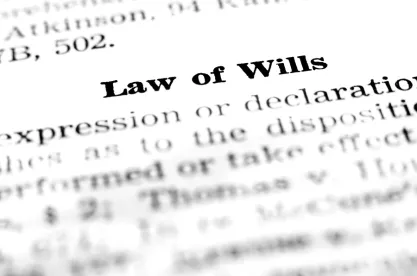This newsletter is intended to keep readers informed about developments in probate and fiduciary litigation in Massachusetts and New York.
Massachusetts Anti-SLAPP Statute Does Not Apply to Objections to a Fiduciary’s Accounting
Matter of Hamm, 487 Mass. 394 (May 10, 2021)
Massachusetts’ anti-SLAPP (an acronym for “strategic litigation against public participation”) statute grants to any party against whom a claim is brought by reason of that party's exercise of her "right of petition under the constitution of the United States or of the commonwealth," the right to file a special motion to dismiss the claim. Does that right extend to dismissal of a beneficiary’s objection to a fiduciary’s accounting? In Matter of Hamm, the Massachusetts Supreme Judicial Court answered that question in the negative.
In Hamm, a conservator, pursuant to order of the probate court, filed final accounts for the 17 years that she and her husband were conservators for their son. The son filed objections to the accounts and the conservator moved to dismiss the objections, arguing (among other things) that the anti-SLAPP statute required dismissal of the objections. The probate court did not reach the question of whether the anti-SLAPP statute applied at all, but denied the motion on the merits. On appeal, the Supreme Judicial Court held that the anti-SLAPP statute did not apply to a beneficiary’s objections to a fiduciary’s accounting.
While noting that the Massachusetts legislature intended to create “very broad protection for petitioning activities” (such as objections to development projects), the court found that “the circumstances presented here” were of a “wholly different” nature. Finding a “fundamental difference” between a fiduciary’s accounting and “the types of lawsuits that were the basis for anti-SLAPP legislation,” the court pointed to the fiduciary relationship between the conservator and the beneficiary. “It is incumbent on the conservator to provide an accounting; she is required to do so by statute, and the protected person has the right, by statute, to file an affidavit of objection to the accounting.” The court affirmed the probate court’s denial of the conservator’s motion to dismiss on that ground, rather than on the merits.
Takeaway: While anti-SLAPP legislation has an important role in preventing litigation from chilling the right to petition, Hamm indicates that the legislation is unlikely to play any role in litigation between fiduciaries and beneficiaries.
Assets Acquired by Estate After Death Are Distributed According to Intestacy Laws, Rather than Pursuant to Will
Matter of Keough, 2021 WL 2471064 (June 18, 2021)
If an estate acquires assets after the testator’s death, are those assets distributed pursuant to the testator’s will or pursuant to the laws of intestacy (even though there is a will)? In Matter of Keough, New York’s Appellate Division resolved this unsettled question in favor of the laws of intestacy.
William Keough (William) was one of the hostages who was held captive in Iran for 444 days between 1979 and 1981. William had three children, including Steven Keough (Steven). William died in 1985, and his wife, Katherine Keough (Katherine) died testate in September 2004. In her will, Katherine devised the residuary of her estate to her stepson, Steven. Katherine’s sole distributee under New York’s laws of intestacy was her brother, Fred (Fred).
In 2015, Congress enacted the Justice for United States Victims of State Sponsored Terrorism Act (Act), which provided monetary compensation to former Iranian hostages and their family members. Under the Act, Katherine’s estate was entitled to $600,000. Fred passed away prior to Katherine’s estate’s receipt of the monetary compensation, but the administrator of his estate filed a petition to claim the monetary compensation due to Katherine’s estate. Fred’s administrator argued that assets acquired by an estate after a testator’s death pass according to the laws of intestacy (i.e., to Fred) rather than pursuant to the testator’s will (i.e., to Steven). The Surrogate disagreed and dismissed the petition, ruling that the will controlled.
The Appellate Division reversed, holding that the laws of intestacy control the disposition of assets acquired by an estate after the death of the testator, notwithstanding the testator’s will. The court’s starting point was New York EPTL 3-3.1, which provides that “a disposition by the testator of all his [or her] property passes all of the property he [or she] was entitled to dispose of at the time of his [or her] death” (emphasis added). The court reasoned that a testator lacks capacity to devise property he or she does not own at the time of death because one requirement of testamentary capacity is “whether [the testator] knew the nature and extent of the property [he or] she was disposing of.” The court concluded: “Here, Katherine did not have the testamentary capacity to dispose of assets she did not own at the time of her death because she could not have ‘kn[own] the nature and extent’ of such assets at that time.”
Takeaway: It may be relatively rare that an estate acquires assets after the testator’s death, but it does occur; and Keough is a case of first impression in the New York State courts as to how such assets are to be distributed. Review by New York’s Court of Appeals may ensue.
Fiduciary Tolling Rule Allows Constructive Trust Claim as to Fiduciary’s 2009 Self-Dealing
Matter of Estate of George, 2021 WL 2005882 (May 20, 2021)
When does the six-year statute of limitations start to run with respect to a constructive trust claim as to wrongful acts by a fiduciary? In Matter of Estate of George, New York’s Appellate Division held that a constructive trust claim “does not accrue,” and thus the statute of limitations on such a claim does not begin to run, “until there is an open repudiation of the fiduciary obligation or a judicial settlement of the fiduciary’s account.” This allowed a constructive trust claim filed in 2019 to proceed against the then-executor of the decedent’s estate for self-dealing in 2009.
In July 2008 the decedent entered into a contract to purchase a mansion known as Llenroc for $2.8 million payable over thirteen months, with title to pass upon completion of the payments. Decedent made the down payment and subsequent payments, and moved into Llenroc. However, decedent passed away in June 2009. His surviving spouse (“Annie”), named as executor in decedent’s will, then terminated decedent’s contract to purchase Llenroc and entered into a new contract to purchase Llenroc for $1,878,500 – the balance owing under the original contract – on behalf of an LLC of which she was managing member. Because of this and other matters, Annie was removed as executor by the Surrogate and new letters testamentary were issued to decedent’s brother in April 2014. Administration of the estate was eventually taken over by the county’s public administrator in 2016.
In January 2019, the public administrator filed a petition seeking to impose a constructive trust upon Llenroc, noting that Annie’s LLC had received the benefit of the payments of almost $1 million made by decedent towards the purchase of Llenroc before his death. The LLC moved to dismiss the petition as time-barred, arguing that the statute of limitations barred a claim in 2019 as to the LLC’s purchase in 2009. The Surrogate dismissed the claim as time-barred, but the Appellate Division reversed, stating: “Under the fiduciary tolling rule, a claim alleging wrongful conduct by an individual in his or her fiduciary capacity does not accrue until there is an open repudiation of the fiduciary obligation or a judicial settlement of the fiduciary’s account. … Applying this rule to the facts in this case, we find that the statute of limitations was tolled from November 16, 2009, when [Annie] received letters testamentary, … until April 30, 2014, when [the decedent’s brother’s] letters were granted” – a tolling period of over four years and five months, rendering the constructive trust claim timely.
Takeaway: In analyzing a claim of breach of fiduciary duty or constructive trust involving a fiduciary, it is important to keep in mind that while the fiduciary is still in his or her position, and has not accounted, the statute of limitations is tolled by the fiduciary tolling rule. This may allow claims as to transactions going back more than six years.







 />i
/>i

